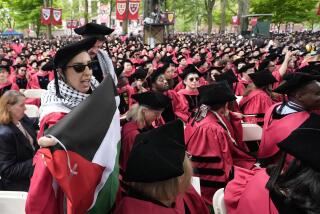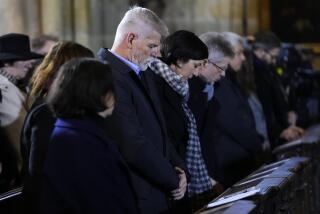Czech Students Back in Streets--to Celebrate
- Share via
PRAGUE, Czechoslovakia — With their revolution moving toward victory, Prague’s students have been back in the streets again. This time, they are celebrating.
Just before noon Saturday, about 3,000 students gathered on Narodny Street in the city center, where three weeks ago police attacks on students provided the spark that set Czechoslovak politics ablaze. This time, on the site of the attack, the students gathered to accept thousands of victory roses sent by students from Portugal.
The day before, the subject on the students’ minds was not Marx, but Lennon. John Lennon, the late Beatle, is a cult figure among young Czechoslovaks, who revere him as an advocate of peace and human rights. On Friday, the anniversary of his death, thousands of them turned out on a chilly moonlit night to celebrate his memory.
The scene of the celebration was a wall near Charles University here, where students used to gather surreptitiously to lay flowers and poetry in Lennon’s honor. The running battle between police, who would remove the offerings during the day, and students, who would replace them at night, became a symbol of Czechoslovakia’s refusal to bow to dictatorship.
And now, with that resistance on the verge of triumph, the youth of Prague jammed themselves into the small square around the wall to listen to poetry, sing Lennon’s songs and light candles in his memory.
The celebration is “a small drop” in the democratic flood, said one bearded man who had brought his two sons, ages 6 and 12, to the scene. But, he added as he helped the boys light their candles, “any drop will help.”
Candles, a symbol of hope, have become a dominant image of Czechoslovakia’s peaceful revolution.
At each of the spots along Narodny where demonstrators were beaten, students came back over the next several days to light candles.
Three weeks later, on a snowy Saturday afternoon, as student leaders stood on top of a blue transit bus to accept the Portuguese roses, the candles were still there. The growing piles of multicolored wax topped with flames dancing through the short daylight hours and into the gloom of the early winter darkness have become new additions to this city’s catalogue of monuments.
“The fight of Czechoslovakia is the fight of Europe,” one of the Portuguese students told the crowd. “We are with you in hope.”
As the students sang the Czechoslovak national anthem, an old man stood in the crowd, watching, his face quivering with emotion. The crowd stood politely, holding their fingers up in the V for victory signal, as five Portuguese representatives tried to sing their anthem.
And then, quietly, politely, the student leaders dipped their arms into the huge box of roses and began distributing the flowers throughout the crowd.
Just down Narodny from the demonstration site is the Magic Lantern Theater, which in the early days was the headquarters of Civic Forum, the country’s main opposition group, and which still serves as the scene of Civic Forum press conferences.
On Friday, center stage was occupied by another act in Czechoslovakia’s democratic revival. The editorial board of Lidove Noviny (People’s News)--the monthly “extralegal” dissident paper--had called a press conference to announce that, as of Jan. 1, it will begin publishing legally.
For two years, the paper has published 450 copies each month, trusting its readers to find ways to multiply the copies themselves and spread the publication hand to hand. For the legal paper, the editors have a vastly different plan.
The next issue of the paper will have a print run of 500,000, editor Jiri Ruml said, a stunning figure for a nation with a population of 15.5 million.
In time, said Ruml, who was arrested in October for his work on the paper, Lidove Noviny hopes to become a nationally circulated, independent daily, the first independent aboveground newspaper in this country in four decades.
From the Magic Lantern, a four-stop subway ride takes one to the Palace of Culture, the vast, neo-Stalinist convention hall where the shape of the country’s new government was hammered out in round-table talks.
The trip, which costs only one crown--about 2 cents at the current black-market exchange rate, or a dime at the legal rate--provides not only a quick ride on Prague’s clean, safe subway system but also a short education in the current political debate.
The walls of the subway stations are covered with posters, declarations and manifestoes, testifying to the profusion of views that have sprung up since Communist power here began to careen toward its downfall.
More to Read
Sign up for Essential California
The most important California stories and recommendations in your inbox every morning.
You may occasionally receive promotional content from the Los Angeles Times.














